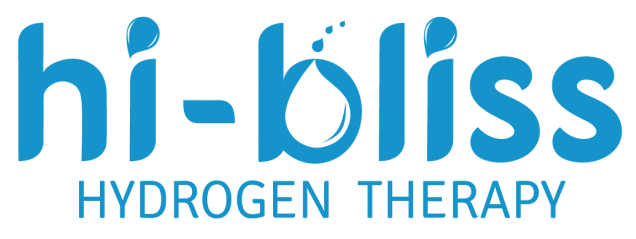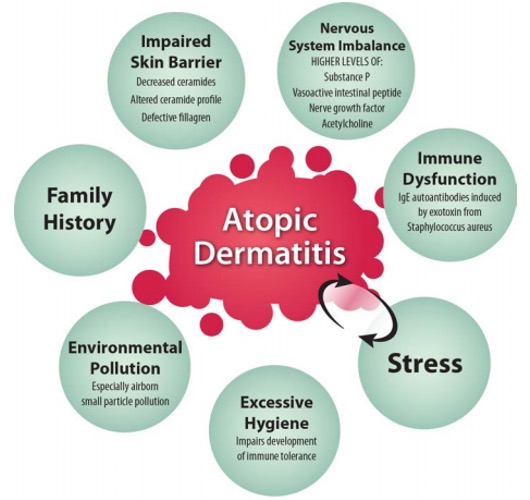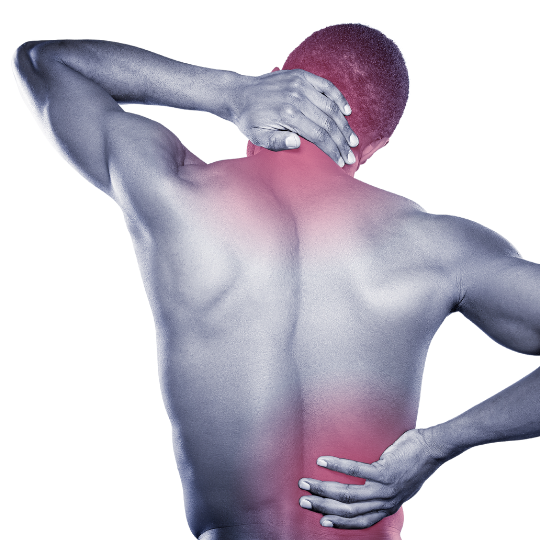
Your skin might be fine for a long time. But then something happens to cause a rash or itchiness. Some things that trigger atopic dermatitis or make it worse include:
- Strong soaps and detergents
- Some fabrics, like wool or scratchy materials
- Perfumes, skin care products, and makeup
- Pollen and mold
- Animal dander
- Tobacco smoke
- Stress and anger
- Dry winter air/low humidity
- Long or hot showers/baths
- Dry skin
- Sweating
- Skin infections or especially dry skin
- Certain hormones
- Dust or sand
- Certain foods (usually eggs, dairy products, wheat, soy, and nuts)
Natural remedies to ease your Atopic Dermatitis Flare-Ups/ Triggers
Though there is no known cure for Atopic Dermatitis, Eczema, these are a few natural remedies to help you ease and manage your AD flare-ups.
- Apply cool compresses to your skin or take warm oatmeal baths. Antioxidants in ground oatmeal may help ease inflammation and itching.
- Use a humidifier. Adding moisture to the air can help keep your skin from drying out and being itchy.
- Do not scratch your skin. Try putting pressure on itchy areas instead of scratching them, and keep your nails trimmed. With children, you may want to have them wear gloves at night to keep them from scratching while they sleep.
- Wear loose clothing made from soft fibres, like cotton, that will not bother your skin. Loose-fitting clothes will not rub against your skin, and they can help keep you from sweating.
- Moisturize your skin daily with a rich, oil-based cream or ointment to form a protective barrier against the elements. Apply the cream right after you get out of the shower or bath to seal in moisture.
- Use fragrance-free detergents, cleansers, makeup, and other skin care products. Wear gloves and protective clothing whenever you handle chemicals.
- A healthy diet and quality sleep also help keep triggers in check.
- Hydrogen Therapy or hydrate by drinking Hydrogen Water. Its potent antioxidant powers plus anti-inflammatory properties can help provide relief and may reduce the frequency of flare-ups.
How Hydrogen Therapy Helps Atopic Dermatitis Condition
Hydrogen is the first component of the periodic table. The most important function of hydrogen in the human body is to keep you hydrated. Water is made up of hydrogen and oxygen and is absorbed by the cells of the body.
Hydrogen contains dissolved molecular hydrogen, which can ease oxidative stress and has shown therapeutic effects in several pathological conditions, including AD. It is an element which is present in all the fluids of the human body which allows the toxins and waste to be transported and eliminated properly. Hydrogen has also been reported to increase glutathione peroxidase activity, downregulate thymus and activation-regulated chemokine (TARC).
These are implicated in the pathogenesis of AD and used as an indicator of disease severity. Thymus and activation-regulated chemokine binds to the chemokine receptor CCR4 and induces chemotaxis in T cells, therefore acting as a proinflammatory factor in AD. It has been suggested that H2 may have therapeutic potential in AD by reducing TARC.

- Anti-inflammatory properties to reduce inflammation. Hydrogen contains anti-inflammatory properties as it can reduce the level of pro-inflammatory cytokine. This is effective in controlling inflammation related diseases such as atopic dermatitis. It can bring down the inflammation by suppressing the inflammatory cytokines production not only on the affected area but also the inflammation in the body. When inflammation is reduced, the symptoms of AD such as redness, dryness and itchiness of the skin will be reduced which subsequently minimizes pain and swelling.

- Powerful antioxidant to protect cells, restore organ functions & stabilize overactive immune system. Hydrogen is a potent antioxidant as not only does it help in reducing inflammation, but it is also able to protect our cells and restore organ function. This is vital for AD patients whose organs may be compromised. Hydrogen is also able to stabilize the overactive immune system caused by AD as it selectively neutralises excessive free radicals in the body that trigger an unnecessary response from the immune system. When the number of free radicals is reduced, the immune system becomes more stable and this reduces the risks of an allergic reaction occurring, hence minimizing AD flare ups.
In conclusion, hydrogen is a safe and effective medical gas that has been proven to be able to treat and control various diseases. It can suppress the levels of inflammation related mediators such as Th1, Th2, and pro-inflammatory cytokines which are the main cause in the development of diseases such as atopic dermatitis in the human body. In conclusion, Hydrogen has cemented its place as an alternative preventive treatment for AD that is also beneficial to the human body.
Functions Of The Skin
The SKIN is the largest and fastest-growing organ in the body. It has several important functions such as:
- to hold organs, muscles, and other tissues
- to maintain the body temperature
- to protect the internal organs from external factors like germs and water
The skin is made up of several layers, which protect the body from pressure, temperature, micro-organisms, radiation and chemicals.
Functions Of The Skin

The liver is the only organ in our body that can repair itself. It has a variety of functions like the ability to break down toxins, deactivate hormones, filter waste products to the bowels & kidneys, and to store nutrients such as vitamins A, D and B12. Due to this, the digestive and elimination systems which include the skin and kidneys may be affected by a sluggish liver.
When the liver is exhausted, it is unable to eliminate toxins. Other organs such as the kidneys and skin are forced to replace its role to eliminate toxins and wastes out from the body via the epidermis. This can disrupt the skin, especially if it is already sensitive or is inflicted with eczema. These toxins can easily cause irritation, itchiness and even a dreaded flare-up.
Hi-Bliss Hydrogen Therapy: Treatment Case Study


Source:
- https://www.atopicdermatitisrevealed.ca/understanding-atopic-dermatitis
- https://atopicdermatitis.net/skin-body-parts-affected/
- https://emedicine.medscape.com/article/1049085-overview
- https://www.medicinenet.com/atopic_dermatitis/article.htm
Whole Health: http://projects.hsl.wisc.edu/SERVICE/modules/24/M24_EO_Skin_Health.pdf - https://www.webmd.com/skin-problems-and-treatments/eczema/eczema-basics#2



